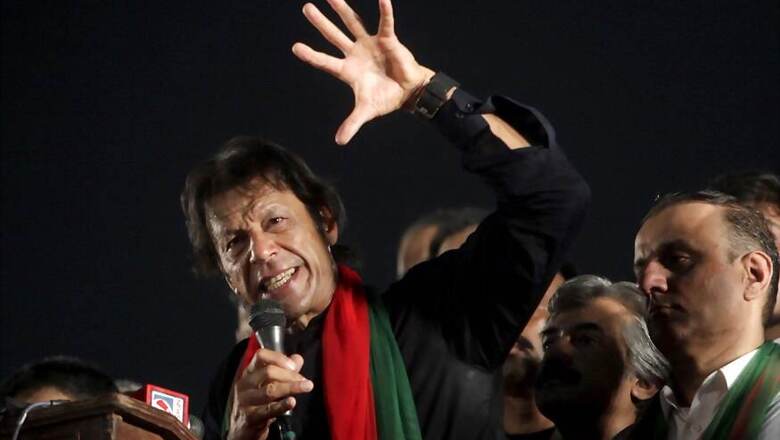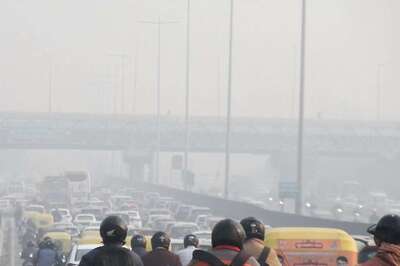
views
The jury is still divided over Imran Khan, the chairman of Tehreek-e-Insaf (PTI) who ran a strong campaign on an anti-corruption message. For some he is akin to Donald Trump and for some he is the ‘messiah’ Pakistan needs today. But most observers agree that the cricketer-turned-politician is the frontrunner in the Pakistan elections.
Khan’s rise in politics has been controversial but meteoric. In 1996 Khan formed his party PTI and fought the election in 1997 from two constituencies—NA-53 (Mianwali) and NA- 94 (Lahore)—but lost both to PML-N candidates. For the next four years he didn’t do much in the political spectrum other than his covert support for General Pervez Musharraf. In the 2002 elections, he won only his own seat from Mianwali and that’s when his tied with army and his right-wing inclinations started to surface. It was during this time that Khan was strongly linked to the Lt Gen Hameed Gul, the former head of the ISI.
Khan boycotted the next elections and was almost away from the political scene. However, the political vacuum in Pakistan at that time meant that in Khan, the people of Pakistan and Punjab saw someone who could openly challenge the mighty Nawaz Sharif. And so he did.
On October 30, 2011, almost half a million people attended Khan’s rally at Minar-e-Pakistan, the biggest show of strength since Benazir Bhutto's April 10, 1986 return from exile. That’s why, perhaps, the last elections were the turning point in his politics, when his party swept polls in Khyber Pakhtunkhwa and completely wiped out both JUI-F – a religious party – and secular-cum-nationalist Awami National Party. In Punjab, the PPP vote bank switched to PTI, showing a silent dissent against the party policies after Benazir's assassination.
The tenure of the Zardari-led PPP government from 2008 and that of the Sharif led PML(N) government from 2013, revealed a newer side of Khan that has since become his trademark: the ability to mobilise large numbers of supporters in Pakistan’s main cities. This led to his famous agitation in the heart of Islamabad from August to December 2014 that weakened Nawaz Sharif’s government due to corruption charges he leveled against the Nawaz family.
That’s when Imran Khan’s political fortunes took a turn. On 4 April 2016, the leaked Panama Papers showed involvement of the Sharif family in offshore companies, including two used to buy luxury homes in London. Imran took an advantage of the situation and threatened to paralyse the capital, Islamabad, with a "lockdown" of street protests unless demands for an independent investigation into the Panama revelations were met. Two months later the Supreme Court of Pakistan agreed to set up a judicial commission to probe corruption allegations against Sharif, stemming from Panama Papers leaks and Imran backed down from lockdown threat.
On July 28, 2017, Pakistan’s Supreme Court declared Sharif disqualified from office for not declaring income from a company in United Arab Emirates. The court also ordered the National Accountability Bureau (NAB) to open a criminal trial into ownership of the London flats along with several other Panama Papers revelations. On April 13, 2018, the Supreme Court further ruled Sharif to be banned from political office for life. In July 2008, Pakistan's anti-corruption court convicted the ousted Prime Minister Nawaz Sharif in absentia and sentenced him to 10 years in prison, in what seemed to be the end of a long and tumultuous political career of the three-time leader.
All this while Imran mobilised his party workers and made stinging attacks on Nawaz Sharif and his family. His election campaign itself heavily focused on driving corruption from the country.
Today, Imran Khan is widely regarded as being an ally of what remains the most powerful institution in Pakistan – the army. While his supporters may disagree on that, one can’t help but notice what he had said in 1995, just a year before he founded PTI: “I don’t believe in a parliamentary democracy. Nobody can speak the truth in a party-based system.”
That’s why, perhaps, in a rare praise for Imran Khan, General (retd) Pervez Musharraf in May this year had said that the Pakistan Tehreek-e-Insaf chief had a very good chance of being elected as the PM in the upcoming elections. The former president, who came to power after a coup over Nawaz Sharif’s government in 1999, touted Imran as a ‘better’ choice tha PML-N supreme leader Nawaz Sharif and PPP co-chairperson Asif Ali Zardari.
Victory for Khan in today’s elections would mean an end to decades of domination by the Bhutto and Sharif families, members of whom have served as either prime minister or president for half the time since 1970.

















Comments
0 comment